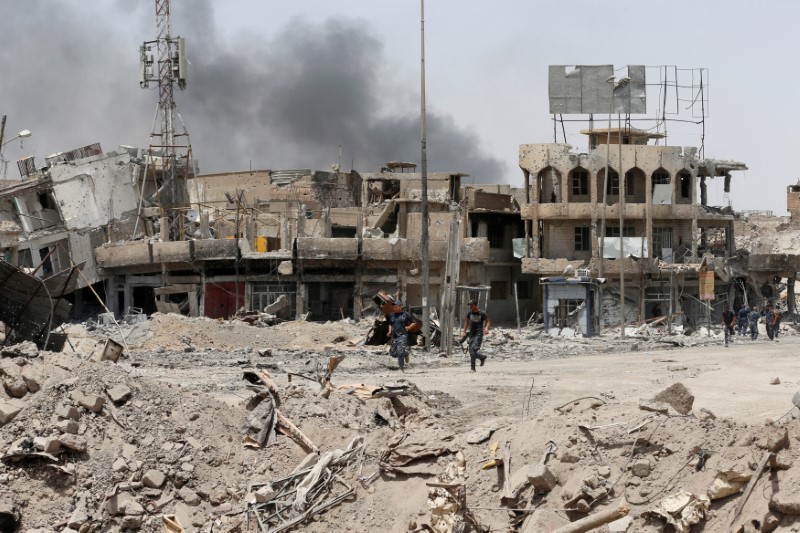
By John Davison and Rodi Said
RAQQA, Syria (Reuters) – U.S.-backed militias said they had defeated Islamic State in its former capital Raqqa on Tuesday, raising their flags over the jihadist group’s last footholds in the city after a four-month battle.
The fighting was over but the alliance of Kurdish and Arab militias was clearing the stadium of mines and any remaining militants, said Rojda Felat, commander of the Raqqa campaign for the Syrian Democratic Forces (SDF).
A formal declaration of victory in Raqqa will soon be made, once the city has been cleared of mines and any possible Islamic State sleeper cells, said Talal Silo, the SDF spokesman.
The fall of Raqqa, where Islamic State staged euphoric parades after its string of lightning victories in 2014, is a potent symbol of the jihadist movement’s collapsing fortunes.
Islamic State has lost most of its territory in Syria and Iraq this year, including its most prized possession, Mosul. In Syria, it has been forced back into a strip of the Euphrates valley and surrounding desert.
The SDF, backed by a U.S.-led international alliance, has been fighting since June to take the city Islamic State used to plan attacks abroad.
Another Reuters witness said militia fighters celebrated in the streets, chanting slogans from their vehicles.
The fighters and commanders clasped their arms round each other, smiling, in a battle-scarred landscape of rubble and ruined buildings at a public square.
The flags in the stadium and others waved in the city streets were of the SDF, its strongest militia the Kurdish YPG, and the YPG’s female counterpart, the YPJ.
Fighters hauled down the black flag of Islamic State, the last still flying over the city, from the National Hospital near the stadium.
“We do still know there are still IEDs and booby traps in and amongst the areas that ISIS once held, so the SDF will continue to clear deliberately through areas,” said Colonel Ryan Dillon, a spokesman for the coalition.
In a sign that the four-month battle for Raqqa had been in its last stages, Dillon said there were no coalition air strikes there on Monday.
TRAPPED BY FIGHTING
Fatima Hussein, a 58-year-old woman, sitting on a pavement smoking a cigarette said she had emerged from her house after being trapped for months by the fighting. Islamic State had killed her son for helping civilians leave the city, she said.
The SDF, an alliance of Kurdish and Arab militias, took the National Hospital in fierce fighting overnight and early on Tuesday, said spokesman Mostafa Bali in a statement.
“During these clashes, the National Hospital was liberated and cleared from the Daesh mercenaries, and 22 of these foreign mercenaries were killed there,” said Bali, using the Arabic acronym for Islamic State.
An SDF field commander who gave his name as Ager Ozalp said three militiamen had been killed on Monday by mines that have become an Islamic State trademark in its urban battles.
Another field commander, who gave his name as Abjal al-Syriani, said SDF fighters had found burned weapons and documents in the stadium.
The stadium and hospital became the last major positions held by Islamic State after the departure of some of its fighters on Sunday, leaving only foreign jihadists to mount a last stand.
The SDF has been supported by a U.S.-led international coalition with air strikes and special forces on the ground since it started the battle for Raqqa city in early June.
The final SDF assault began on Sunday after a group of Syrian jihadists quit the city under a deal with tribal elders, leaving only a hardcore of up to 300 fighters to defend the last positions.
PASSPORTS AND MONEY
Raqqa was the first big city Islamic State captured in early 2014, before its rapid series of victories in Iraq and Syria brought millions of people under the rule of its self-declared caliphate, which passed laws and issued passports and money.
It used the city as a planning and operations centre for its warfare in the Middle East and its string of attacks overseas, and for a time imprisoned Western hostages there before killing them in slickly produced films distributed online.
The SDF advance since Sunday also brought it control over a central city roundabout, where Islamic State once displayed the severed heads of its enemies, and which became one of its last lines of defence as the battle progressed.
The offensive has pushed Islamic State from most of northern Syria, while a rival offensive by the Syrian army, backed by Russia, Iran and Shi’ite militias, has driven the jihadists from the central desert.
On Tuesday, a military media unit run by Lebanon’s Hezbollah group said the Syrian army on whose side Hezbollah fights had pushed into the last Islamic State districts in Deir al-Zor.
The only populated areas still controlled by the jihadist group in Syria are the towns and villages downstream of Deir al-Zor along the Euphrates valley. They are areas that for the past three years Islamic State ran from Raqqa.
(Additional reporting by Ellen Francis and Dahlia Nehme in Beirut; Writing by Angus McDowall in Beirut; Editing by Matthew Mpoke Bigg)

